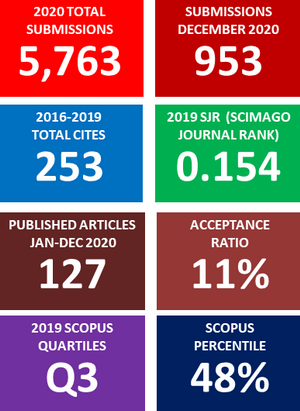Fault-Tolerant Control using Adaptive Time-Frequency Method in Bearing Fault Detection for DFIG Wind Energy System
Keywords:
Doubly-fed induction generator (DFIG), fault-tolerant control, monitoring, wind turbine, rotor side inverter, bearing faultAbstract
With the advances in power electronic technology, doubly-fed induction generators (DFIG) have increasingly drawn the interest of the wind turbine industry. To ensure the reliable operation and power quality of wind power systems, the fault-tolerant control for DFIG is studied in this paper. The fault-tolerant controller is designed to maintain an acceptable level of performance during bearing fault conditions. Based on measured motor current data, an adaptive statistical time-frequency method is then used to detect the fault occurrence in the system; the controller then compensates for faulty conditions. The feature vectors, including frequency components located in the neighborhood of the characteristic fault frequencies, are first extracted and then used to estimate the next sampling stator side current, in order to better perform the current control. Early fault detection, isolation and successful reconfiguration would be very beneficial in a wind energy conversion system. The feasibility of this fault-tolerant controller has been proven by means of mathematical modeling and digital simulation based on Matlab/Simulink. The simulation results of the generator output show the effectiveness of the proposed fault-tolerant controller.doi:10.14456/WJST.2015.9
Downloads
Metrics
References
WL Kling and JG Slootweg. Wind turbines as power plants. In: Proceedings of the IEEE Cigré Workshop on Wind Power and the Impacts on Power Systems, Oslo, Norway, 2002.
A Kusiak, A Verma and X Wei. Wind Turbine Frontier from SCADA. Wind Syst. Mag. 2012; 3, 36-9.
T Burton, D Sharpe, N Jenkins and E Bossanyi. Wind Energy Handbook. John Wiley & Sons, 2001.
M Wilkinson, F Spianto, M Knowles and PJ Tavner. Towards the zero maintenance wind turbine. In: Proceedings of the 41st International Universities Power Engineering Conference, Newcastle-upon-Tyne, 2006, p. 74-8.
D McMillan and GW Ault. Quantification of condition monitoring benefit for offshore wind turbines. Wind Eng. 2007; 31, 267-85.
PJ Tavner, GJW van Bussel and F Spinato. Machine and converter reliabilities in wind turbines. In: Proceedings of the 3rd IET International Conference on Power Electronics, Machines and Drives, Dublin, Ireland, 2006, p. 127-30.
P Caselitz and J Giebhardt. Advanced Maintenance and Repair for Offshore Wind Farms using Fault Prediction and Condition Monitoring Techniques (OffshoreM&R). The European Commission, DG TREN.
IAS Motor Reliability Working Group. Report of large motor reliability survey of industrial and commercial installations: Part I and Part II. IEEE Trans. Ind. Appl. 1985; 21, 853-72.
JR Stack, TG Habetler and RG Harley. Fault classification and fault signature production for rolling element bearings in electric machines. IEEE Trans. Ind. Appl. 2004; 40, 735-9.
RR Schoen, TG Habetler, F Kamran and RG Bartheld. Motor bearing damage detection using stator current monitoring. IEEE Trans. Ind. Appl. 1995; 31, 1274-9.
M Blodt, P Granjon, B Raiso and G Rostaing. Models for bearing damage detection in induction motors using stator current monitoring. IEEE Int. Symp. Ind. Electron. 2004; 1, 383-8.
JR Stack, TG Habetler and RG Harley. Bearing fault detection via autoregressive stator current modeling. IEEE Trans. Ind. Appl. 2004; 40, 740-7.
Y Amirat, V Choqueuse, MEH Benbouzid and JF Charpentier. Bearing fault detection in DFIG-based wind turbines using intrinsic mode function. In: Proceedings of the XIX International Conference on Electrical Machines, Rome, Italy, 2010.
S Pourmohammad and A Fekih. Fault-Tolerant control of wind turbine systems-A review. In: Proceedings of the IEEE Green Technologies Conference, Baton Rouge, LA, 2011.
MEH Benbouzid, M Vieira and C Theys. Induction motors’ faults detection and localization using stator current advanced signal processing techniques. IEEE Trans. Power Elecron. 1999; 14, 14-22.
WJ Wiedenbrug, A Ramme, E Matheson, VA Jouanne and AK Wallace. Modern online testing of induction motors for predictive maintenance and monitoring. IEEE Trans. Ind. Appl. 2002; 38, 1466-72.
A Bellini, F Filippetti, G Franceschini, C Tassoni, R Passaglia, M Saottini, G Tontini, M Giovannini and A Rossi. On-field experience with online diagnosis of large induction motors cage failures using MCSA. IEEE Trans. Ind. Appl. 2002; 38, 1045-53.
SA McInerny and Y Dai. Bearing vibration signal processing for bearing fault detection. IEEE Trans. Educ. 2003; 46, 149-56.
W Zhou, TG Habetler and RG Harley. Stator current-based bearing fault detection techniques: A general review. In: Proceedings of the IEEE International Symposium on Diagnostics for Electric Machines, Power Electronics and Drives, Cracow, 2007.
LH Hansen, L Helle, F Blaabjerg, E Ritchie, S Munk-Nielsen, H Bindner, P Sørensen and B Bak-Jensen. Conceptual Survey of Generators and Power Electronics for Wind Turbines. Risø National Laboratory, Roskilde, Denmark, 2001.
P Krause, O Wasynczuk and S Sudhoff. Analysis of Electric Machinery and Drive Systems. 2nd ed. New York, IEEE Press, 2002.
R Pena, JC Clare and GM Asher. Doubly fed induction generator using back-to-back PWM converters and its application to variable speed wind-energy generation. IEEE Proc. Electron. Power Appl. 1996; 143, 231-41.
Downloads
Published
How to Cite
Issue
Section
License

This work is licensed under a Creative Commons Attribution-NonCommercial-NoDerivatives 4.0 International License.









